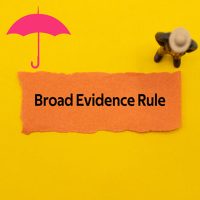Understanding The Broad Evidence Rule

Property damage is very common in Florida, largely due to the fact that so many serious and violent storms hit the state every year. If your property has become damaged, you are likely wondering whether your insurer will determine the monetary value of your loss. The fact is that the coverage you receive can vary based on a number of different factors.
Even if you are depending on receiving the actual cash value of the property, you may receive much less due to the Broad Evidence Rule. Below, our Daytona Beach residential and commercial property damage lawyer explains more about this rule and how it may affect your claim.
How Insurance Companies Use the Broad Evidence Rule
The Broad Evidence Rule provides a loose framework for insurance companies to value the property damage and losses you sustained. Insurers are not required to use any specific formula when calculating the amount of coverage you are entitled to. This can fill you with uncertainty when filing a property damage claim. A few important things to remember about the Broad Evidence Rule are as follows:
- The Rule will not account for the actual cash value of the damage to your property and other losses.
- The Rule, however, does allow insurance companies to consider many different factors, including the original cost, market value, age and condition of the property, replacement cost, frequency of use, location, assessed value, durability of the item, number of users in the residence or business, rarity, offers to purchase, and more.
- Although the Broad Evidence Rule is used in Florida, it has not been adopted by all states.
Is the Rule Fair for Home and Business Owners?
The Broad Evidence Rule alone is not necessarily fair or unfair to home and business owners. It simply leaves the decision to determine the factors used for assessing property damage to the insurance company. The factors the insurance company uses, on the other hand, may not always be considered fair.
To be sure that your insurance company is not using the Broad Evidence Rule to act unfairly towards you, it is important to always ask any company you are considering using what factors they use when determining the value of damaged property. You can then determine whether those factors seem fair to you and if not, find another insurance company that uses factors you determine are fairer and will get you the best value for your dollar.
How Can a Residential and Commercial Property Damage Lawyers in Daytona Beach Help with Your Claim
If your property has been damaged and you do not believe your insurer is valuing your losses accurately or fairly, you do have legal options. At Bundza & Rodriguez, our Daytona Beach residential and commercial property damage lawyers can explain what those are and help you hold the insurance company accountable for paying the full and fair coverage you are entitled to. Call or text us now at 386-252-5170 or chat with us online to schedule a free review of your case and to learn more.
Source:
investopedia.com/terms/b/broad-evidence-rule.asp

